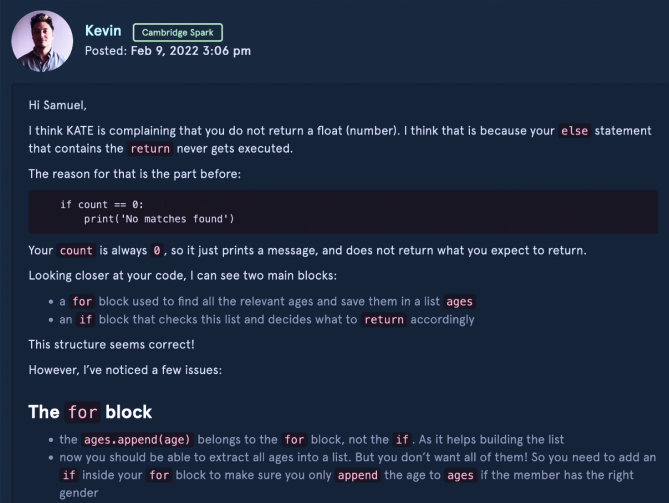Level 4 Data Analyst Apprenticeship
Break out of the limitations of spreadsheets to leverage the analytics power of Python, SQL and introductory machine learning

One data apprentice can create real business impact
£1.4m revenue identified through data-driven insights
£120,000 saved by creating efficiencies
90% shorter project times achieved through automations
5 x faster ML model training achieved though automations
Deliver on your data analytics strategy
The Curriculum
Our curriculum is developed by our leading faculty, composed of data scientists in leading industry positions and academics from some of the top universities in the world. Our curriculum is continuously updated and reiterated to incorporate the latest skills. Our programme includes the core modules, elective modules for learners wishing to pursue specialist areas, as well as monthly Industry Insight sessions delivered by leaders from different sectors.
Core Modules
- Introduction to Python and Pandas
-
Explore Python and Pandas to leverage Python's popularity and Pandas' powerful tools for essential data analysis tasks.
- Data Science for Business
-
Apply data science to solve business problems with data analysis techniques, considering ethics and emerging legislation.
- Further Python and Pandas
-
Develop proficiency in Pandas to efficiently manipulate and process data, enabling advanced data visualisation and modelling techniques for real-world applications.
- Data Visualisation
-
Develop proficiency in Pandas to efficiently manipulate and process data, enabling advanced data visualisation and modelling techniques for real-world applications.
- Time Series Analysis: Foundations
-
Examine the unique challenges of time series data and apply specialised tools and techniques using Pandas, Python, and NumPy to analyse and model data that changes over time.
- Hackathon
-
Work collaboratively in teams on a project to apply newly acquired skills in real-world contexts.
- Maths for Data Analysis
-
Explore essential mathematical concepts including probabilities, statistical significance, and linear algebra to build a strong foundation for understanding AI and Data Science principles.
- Introduction to Machine Learning
-
Understand fundamental machine learning concepts and tools to effectively apply various models and techniques in practical scenarios.
- Databases and SQL
-
Learn to use SQL to efficiently store, query, and retrieve both structured and unstructured data, enabling effective interaction with databases.
- Web Scraping, Text-Mining, JSON and APIs
-
Explore web scraping, textmining, JSON, and API techniques to retrieve and process structured and unstructured data from various web-based sources.
Elective e-Learning Modules:
- Supervised Learning
-
This intermediate module is designed to gain familiarity with an array of discriminative and generative supervised learning models as well as sophisticated techniques to evaluate model suitability and improve model performance.
- Unsupervised Learning
-
This intermediate module covers a wide range of unsupervised learning models and techniques to reveal latent structure within your data and covers topics including KMeans, hierarchical clustering, DBSCAN, PCA and t-SNE.
- Advanced Maths for Data Science
-
This intermediate level module is designed to build more advanced understanding of key mathematical concepts including probability, statistics, linear algebra, calculus and optimisation that underpin much of the AI and Data Science domain.
Eligibility
Intermediate to advanced users of spreadsheets in need of more efficient and powerful tools for working with data on a regular basis, who meet the following criteria:
Suitability of role
- Proficient using spreadsheets and other IT software
- Currently working with lots of data in large spreadsheets
- Can identify how they will apply data analytics in their role to create business impact
- Comfortable with algebra
Eligibility for funding
- No prior Data or Computer Science degree or related experience.
- Employed in England and resident in the UK or EEA for the last 3 years.
- Employees working at least 30 hours a week (part-time employees can be considered for a minimum cohort size)
- Can commit to the minimum 6 hours a week off the job learning requirement for the duration of the programme (14 months of training)
What makes the programme special
We deliver all of our programmes online, helping our clients offer flexible and inclusive programmes open to all of their staff. EDUKATE.AI, our online learning platform, gives learners a sandbox environment to practice their skills, providing them with immediate feedback on industry-simulated assignments. We believe that the gold standard for online delivery is to offer a mix of experiential learning, coaching, technical mentorship and peer support.
Python from Day One
Python is a powerful programming language that is widely used for data analysis. By teaching Python as a core component of our program, learners gain valuable skills that will position them for success in their careers.
Instant Feedback for Accelerated Learning
Our program benefits from the support of EDUKATE.AI, which provides instant feedback on coding work. This unique feature accelerates learning outcomes by allowing learners to see where they need to improve and make corrections in real time.
Real-World Practice for Accelerated Impact
EDUKATE.AI provides a sandbox environment where learners can practice new skills on real datasets. This accelerates the impact that learners can make in their workplace, allowing them to immediately apply what they've learned.
Personalized Learner Support
We provide each learner with a dedicated Data Mentor and Learner Success Coach to support them on their technical and personal development. This personalized support structure helps learners to succeed and overcome obstacles they encounter.
Flexible Fully Online Learning
Our program is fully online, providing maximum flexibility for learners and employers alike. This means that learners can access their content from anywhere, with no set up or installation of EDUKATE.AI required.
Expert Curriculum
Our comprehensive curriculum develops the skills for success in data analytics. As well as core skills such as Python, Pandas and data visualisation, the curriculum introduces learners to machine learning and includes electives in supervised and unsupervised learning.
Community
Joining our program means becoming part of a thriving community of thousands of data professionals. Learners have the opportunity to tap into this rich network of peers and alumni and benefit from the expertise and experience of others in the field.
A real-world learning experience
EDUKATE.AI is our learning experience platform which delivers a seamless experience in one place and accelerates learning and impact through real practice on real projects with immediate, personalised feedback on code.

Enquire now
Fill out the following form and we’ll contact you within one business day to discuss and answer any questions you have about the programme. We look forward to speaking with you.
FAQs
What delivery options do you offer?
Are you able to tailor the programme to the organisation and sector?
What is an apprenticeship?
Apprenticeships are a long-term training commitment which seek to support people entering the workforce and upskill existing UK-based employees within an organisation, enabling employers to foster a workforce consisting of highly-skilled and highly-engaged talent.
The Cambridge Spark Data Analyst Apprenticeship runs 14 months plus a 3-month end-point assessment and includes a minimum of 6 hours per week off-the-job training, enabling a blended approach between theory and practical-learning.
What is the Apprenticeship Levy?
All organisations with annual staff costs of over £3m have to pay 0.5% of their salary bill into a ring-fenced apprenticeship levy pot. The money is collected monthly via PAYE and can only be used for training on approved apprenticeship schemes (such as the Level 4 Data Analyst Apprenticeship that we offer). Organisations must forfeit any levy funding left unspent for 24 months or more.
What if my organisation doesn't pay into the UK Apprenticeship Levy?
What does "off-the-job training" mean?
Our off-the-job training is delivered on a flexible basis and can be carried out at the apprentice’s place of work or home.
The 6 hours per week, minimum, off-the-job training provides learners with the time to focus and develop the required skills, knowledge and behaviours to complete the programme.
How much do managers need to be involved?
We also encourage managers to have regular one-to-one meetings with apprentices to catch up on how they are progressing and to join the apprentice and their coach for 30 minutes every 3-4 months for a general catch up about the programme.
What is the Apprenticeship Levy?
Lorem ipsum dolor sit amet, consectetur adipiscing elit. Quisque dui elit, consectetur ac eleifend ut, aliquet eu ante. Vestibulum ac laoreet leo, tincidunt commodo nisl. Pellentesque ut urna ac tellus egestas aliquet. Sed tincidunt condimentum lorem id lobortis. Nam viverra lacus lectus, sed vulputate risus scelerisque ut. Duis rhoncus lacus et odio sollicitudin ullamcorper non in tellus. Quisque urna metus, elementum et nisi at, molestie elementum ante.
Who's benefitted from our data apprenticeships
Why we’re the education technology training partner of choice.

Case study
Exertis Unlocks £100s of Millions in Working Capital

Case study
Strategy Manager Drives Potential 49% TV Energy Savings

Case study
Data Analyst Apprentice identifies £30k of savings for GSK

Case study
Analyst Democratises Data Insights with Interactive Dashboards